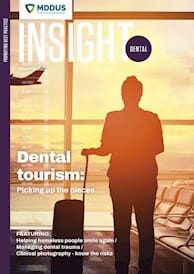 TRAVELLING abroad in search of the perfect smile has become a growing trend in recent years.
At MDDUS, advisory teams have noticed an increasing number of calls from members concerned about their obligations regarding patients who have sought dental treatment abroad.
TRAVELLING abroad in search of the perfect smile has become a growing trend in recent years.
At MDDUS, advisory teams have noticed an increasing number of calls from members concerned about their obligations regarding patients who have sought dental treatment abroad.
A recent BBC documentary highlighted the risks of dental tourism and the trend (made popular more recently on the social media platform TikTok) for so-called “Turkey Teeth”, where young people travel to countries such as Turkey for cut-price dental work.
Cost would appear to be one of the main drivers behind this behaviour, as well as access to cosmetic procedures which may not be readily available in the UK. The pull of a very quick fix, with a week in the sunshine thrown in, appears to be very appealing to some.
Unfortunately, patients having extensive invasive dental treatment outside the UK are unlikely to appreciate the risks involved and the difficulties in getting help if something does go wrong.
Advising patients before they go
The General Dental Council advises patients to consult with their own dentist before travelling abroad for treatment. But of course, not all patients will follow this advice.
Ideally, a dentist would be able to fully discuss the patient’s options, setting out the risks, potential complications and aftercare options.
In addition to potential pain and inconvenience, there can be considerable financial consequences for those seeking treatment outside the UK. Research carried out by the British Dental Association found that many patients face hundreds – if not thousands – of pounds in extra costs to repair damage to their teeth following treatment abroad.
A dentist’s obligations
If a patient presents to your practice following treatment abroad, what should you do? Consider these key points:
- By agreeing to see the patient, the dentist would not be taking on responsibility or liability for any previous work carried out abroad. (The same would apply with a patient previously treated by another clinician in the UK.)
- It is possible that it will not be evident until the patient sits in the dental chair, and the examination begins, that the patient has had treatment carried out elsewhere.
- If the patient is presenting with acute symptoms such as severe pain or swelling, then it could be viewed that the dentist has an ethical obligation to address these symptoms in the same way as they would for any other patient.
- A dentist could examine and provide a provisional diagnosis in response to symptoms and then advise the patient accordingly about their options, including risks, benefits and alternatives.
- Where clinically appropriate, the dentist can provide emergency treatment to alleviate the acute symptoms in accordance with their clinical judgement, whilst also discussing with the patient the clinical findings and their possible future treatment needs.
- Be sure to work within your competence. Dependent on the circumstances, a dentist might not feel that they are the most appropriate person to carry out definitive treatment. The dentist could discuss the patient’s options as to who would be most appropriate to provide treatment, whether that involves returning to the original treating dentist or referral to an appropriate specialist.
- Dentists should not feel pressured to carry out treatment that is beyond their skills/training, or that they believe is not clinically appropriate.
- Be sure to fully document the details of the discussion in the patient’s clinical record. Clinical photographs and radiographs may be a useful adjunct to the written clinical record.
Ending the patient relationship
A common question we hear on the dental advice line is whether the professional relationship with a patient can be ended if they have sought treatment abroad. There are a number of factors to consider before ending a professional relationship with a patient, and you can read more detailed advice on this topic in this Insight Dental article by our editor Sarah Harford.
It seems unlikely that this trend of going abroad for treatment will end anytime soon, with access to dental care in the UK still proving challenging in some areas and the perception of treatment abroad as being “cheap and easy”. Should a patient receive treatment abroad, it can put their usual dentist in a difficult position on their return home, but it is important that we continue to fulfil our professional and ethical duties. Going forward, dentists could play an important role in educating patients about the risks involved before they make potentially unwise decisions.
This page was correct at the time of publication. Any guidance is intended as general guidance for members only. If you are a member and need specific advice relating to your own circumstances, please contact one of our advisers.
Read more from this issue of Insight Dental

Save this article
Save this article to a list of favourite articles which members can access in their account.
Save to library